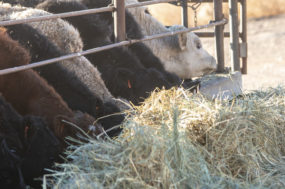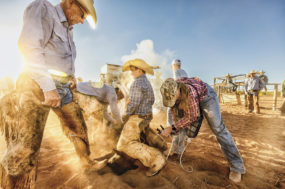The extreme heat and lack of rain came at the tail end of a winter that saw a couple of pretty good snow storms, even blizzard-like conditions with record lows in some areas.
The latter storm had an impact on operations that start calving the middle of February. For those operations that like to calve heifers at least two weeks ahead of mature cows, this was a tough period to endure and calves were lost due to cold.
All in all, it has been a pretty tough year for most ranchers in the area, but if you make trips to the co-op or phone calls to cattlemen across Oklahoma, you’re often greeted by a somewhat upbeat voice on the other end of the line.
A recent conversation with Eddie Parker, Parker Angus, Waurika, Oklahoma reminded me of how close-knit ranching families are and how important it is to pass on the ranching tradition.
Earlier in the summer, Eddie’s wife, Karen, had emailed some pictures of what their pastures and conditions were like, their bouts with a couple wildfires and Eddie standing in the bottom of a dried-up pond with his grandkids, smiling and enjoying the moment.
As I visited with Eddie, even though the tough summer may have pushed him a little, he was as gracious and willing to answer my questions as any other interview conducted over the years.
As Eddie spoke about the drought, the one thing that kept coming up over and over again was the availability of water and how important that was to survival.
Even though most stock ponds or tanks have long been dry on the ranch, Eddie did plan for the worst a few years back and had some help from previous years with dry weather.
“I had been through a drought or two before, but nothing like this since 1980,” Parker said. “I tried to drill three new wells for drinking water and only one of them had any water.
We tied some of our water wells together and tapped into the rural water to make sure we could water the cows.”
“I can withstand a lot of things, but if I don’t have water, I am out of business. I built a couple big stock tanks that I thought could hold a two-year supply of water and I was right.On September 15, we had 6.5 inches of rain in 13 months.”
Preparing for the tough summer also started through the Parkers’ experience in the cattle business and what had been learned from years past.
Increased management was the only answer Eddie could rely on as times got tough due to lack of rainfall.
“I knew when it didn’t rain in May, and that’s when we usually get the bulk of our moisture, it was time to do something different.
We started early-weaning the calf crop, abandoned our embryo transplant program and culled anything that was old or had a problem,” he said.
“Once we got those cows dry, we thought we could get them through the winter on some liquid feed, a little grass and a cost-effective ration the nutritionist at the feed store helped me put together.
If you can save a few dollars here and a few dollars there, it’s amazing how much it helps.”
With the heat and lack of moisture as fall approached, the Parkers knew the annual fall sale could be a challenge.
As I visited with Eddie, he said even though it was the toughest sale he had, everything worked out in the end.
With low cow numbers in the area, some of the repeat buyers who attend the annual sale, were unable to purchase bulls as they had in the past.
After hearing these comments I started scratching my head and wondering where does this man get his spirit, but quickly laughed with Eddie when he made the comment about finishing up planting rye grass in the morning because it was going to get too cold for him to sit on that tractor.
The laughter grew louder, because we both had just experienced the hottest summer on record and didn’t think the day would come where we’d have to get on our winter clothes.
The laughs we shared quickly turned to a serious tone on the other end when Eddie started talking about the future.
“I have to stay in business. If I can get through the hard times, I expect to get rewarded when we start getting some moisture and pastures rebound,” he stated.
“The cattle business is a challenge every year. This year was just really tough. What I try to remember, is the tougher it gets the better it should be when it gets good.”
I could hear the excitement coming through the phone as Eddie talked about how well producers were positioned if they could just stay in business.
After all, this pair of Oklahoma State University graduates works side-by-side and sometimes wonders how all the work will get done in a normal year.
“Before it got dry, we were looking at A.I.’ing 600 cows and Karen asked me how we were going to get it done. I said just stay on schedule and we’ll work through it,” he said.
The lifestyle those of us who are close to our land and family get to enjoy is the best benefit that comes with being in the beef business. Relationships within the industry are also enjoyed by most.
As Eddie and I talked past our bedtime, the camaraderie shared was truly enjoyable, but we both agreed that when you’re doing something you love, there’s never a day’s hard work.
This cliché was magnified a little when he said, “All summer we have had record temperatures and no rain. Now, we have had six inches of rain in the last two or three weeks and it is starting to feel like paradise around here again.” ![]()







